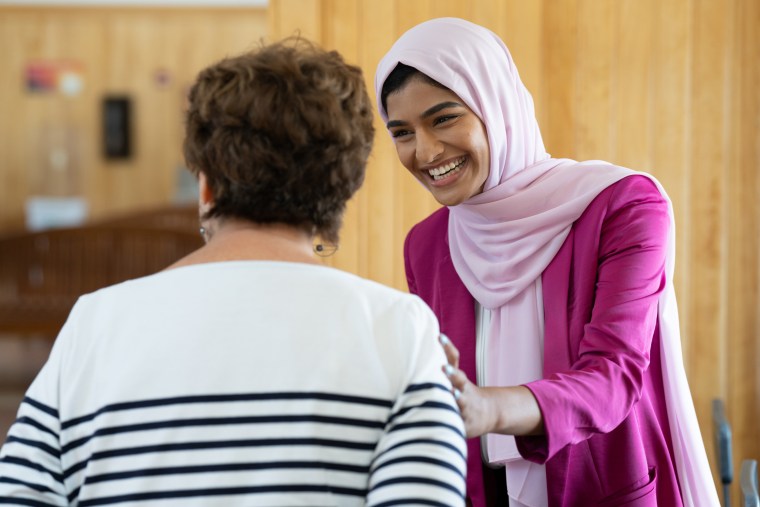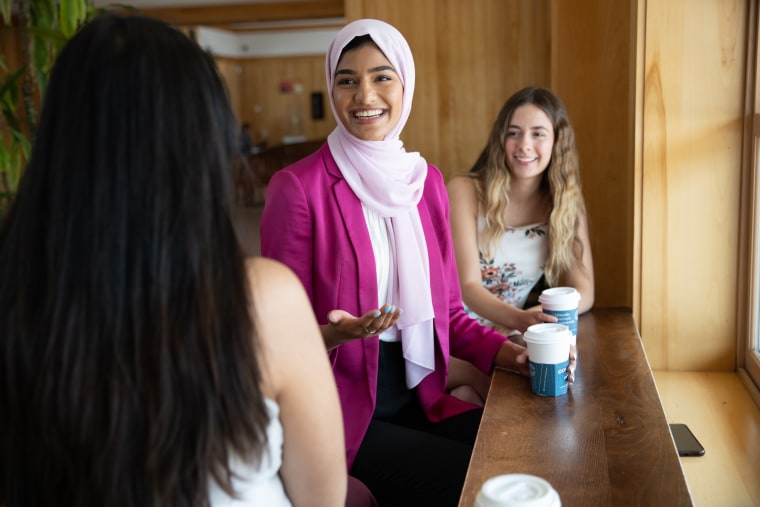Nabeela Syed, 23, came of age during the Trump administration. An Indian Muslim American who wears a hijab, she remembers the former president’s 2016 Election Day with perfect clarity. She was a a senior at her high school in Palatine, Illinois, and the racist, Islamophobic rhetoric being parroted around her sealed her first political memory.
“The day Trump got elected, I remember I cried in every single one of my classes,” she told NBC News. “I felt like this country was not for us. I was like, ‘I don’t know if I belong here.’ This is the only home I’ve ever known, and I was questioning whether or not I belonged here.”
Six years later, in November 2022, another election has come to mean something entirely different for Syed.
This year, her name was on the ballot as a representative for the Illinois General Assembly, and she won. In doing so, Syed flipped the Republican-held 51st District, in which she was born and raised. In January, she will become the youngest member of the assembly.
“It’s important for me — growing up in this community and knowing what it feels like to not belong — to make sure everyone feels like they do belong,” she said. “It’s a big moment for my family personally, and I hope it feels to other young people and to women of color that we can do this. We have space here.”
Her victory has led to an outpouring of support from all over the globe, and the news has gone viral on social media since the election.
“You broke the glass ceiling to pieces,” said one Indian American on Twitter.
Syed’s parents moved to Palatine from Hyderabad, India, in the 1980s. They came here looking for more opportunities, she said, and to establish a family in which their kids could thrive.
“I’m very grateful for all the sacrifices they made so that I could live here,” she said. “Never in their wildest dreams did they think that I would run for political office. And here I am running for office and winning, and it’s because of them…My mother said if I didn’t do it, who would?”
Her parents were not silent supporters either, she said. They were on the campaign trail, canvassing neighborhoods and spreading their pride and belief in their daughter.
“There were people that came up to me on Election Day, and they were like, ‘You look like your dad, he was knocking on doors in my neighborhood,’” she said. “We saw people that were lifelong Republicans, and my dad showed up at their doorstep…Seeing him there made them decide to vote for me.”

Word about her win reached Indian news outlets, as well as U.S. ones, and Syed said her grandmother in particular was touched by the strides she’d made.
“My grandma was straight up sobbing,” Syed said. “She grew up in a completely different era, a completely different environment and culture. To see so many people support someone that looks like me was very very exciting and emotional for her.”
Spending time with her grandmother has instilled a deeply rooted care for her community in Syed, she said, and she’s proud a generation of South Asian women who lacked the support to pursue their dreams can watch that change.
“They’re the ones who have done so much so that I could be here today,” she said. “They’ve taken care of us.”
Like many Generation Zers, Syed grew up watching “Wizards of Waverly Place” and the Cartoon Network and fangirling over One Direction with her friends. She remembers when Twitter and Facebook became popular in middle school, and then when Instagram blew up in high school, but she never expected that within a decade, she’d be using those outlets to connect with her constituents.
After knocking on doors, Syed said she would ask community members to take a selfie with her on the campaign trail. Her social media accounts are full of these selfies, thanking the voters who spoke to her by name.
“That is what is necessary to make politics more palatable, to make campaigns more palatable and to make sure that we’re doing the work to listen to voters,” she said.
She campaigned on a platform of reproductive justice, gun reform and affordable health care, making prescriptions more affordable for those that need them. Social media helped her broadcast her messages louder than she could have hoped, she said. She’s now speaking to an audience of thousands, many of whom are other young South Asians who are looking to her as a leader of their generation.
“Your peers may not have looked like you, your culture is different, the food you bring to lunch, it might look different and smell different, your holidays are different,” she said. “I’m only 23, but I’ve grown a lot more comfortable in my identity. I’m honored to be a young South Asian.”
Her youth and the fact that she’s not far removed from her childhood allows her to recognize young voters’ experiences as her own, she said, and she’s working toward building an Illinois that makes space for everyone.
“This is just one story,” she said. “There are so many other young South Asian folks that are doing incredible things. Whether it’s politics, comedy, social media, medicine, it’s incredible to see how powerful this demographic is.”

